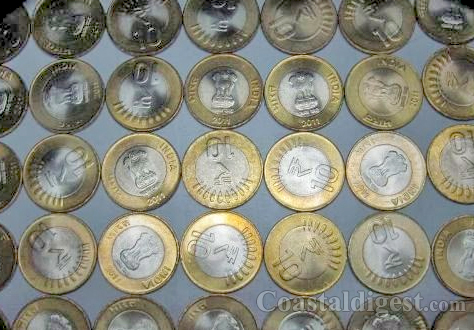Bangalore, Jun 6: The Indian rupee will only make scant gains in the next 12 months as the economy remains weak, although optimism around a new government and a narrowing current account deficit will underpin the currency, a poll found.
 The rupee is among the best-performing emerging currencies this year, rising 4 four percent since January.
The rupee is among the best-performing emerging currencies this year, rising 4 four percent since January.
It hit a one-year high of 58.25 against the dollar on May 22 - a week after Prime Minister Narendra Modi's landslide victory in general elections.
But analysts believe its rally is largely over.
The poll of over 30 currency strategists, conducted June 2-5, predicted one U.S. dollar will fetch 59.25 rupees by the end of June, 59.20 in three months and 60.16 in a year. It was trading around 59.10 early on Friday.
Still, those are the strongest rupee forecasts in a long while. The consensus rose above 60 per dollar in the one- and three- month horizons for the first time since August and follow strong net inflows into Indian financial markets.
Over 337 billon rupees in foreign money poured into Indian stocks and bonds last month, up from almost nothing in April. India's stock market is trading near a record high.
"Much of the rupee's gains in May (were) driven by post-election optimism via portfolio flows into both equities and Indian government bonds," wrote Derek Halpenny at BTMU, who is expecting the rupee to trade at 59 per dollar in a year.
"Modi has been sending all the right signals so far, with considerations to allow at least 49 percent of foreign investments into all sectors."
The ruling Bharatiya Janata Party, the first to win a majority in three decades, is expected to quickly pass key economic reforms and raise foreign investment caps in various sectors of the economy, including defence companies.
The first peek into the new government's policies will come around early July when Finance Minister Arun Jaitley unveils his maiden budget.
Recent data showing a sharp narrowing in the current account deficit to just 0.2 percent of gross domestic product should also prop up the rupee in the interim.
Still, weak growth will probably prevent the rupee from any significant break higher. The economy grew just 4.6 percent in the Jan-March quarter.
The U.S. Federal Reserve's current track to end its economic stimulus before year-end will also hold it back. And the Reserve Bank of India has been intervening in the market daily, buying dollars to prevent sharp rises in the currency from strong foreign inflows.
YUAN
The Chinese yuan is expected to slowly recover from a sharp slide earlier this year. That correction was believed to be engineered by the central bank to curb speculation that the currency will only go one way - up.
The yuan has been the worst performing emerging currency in Asia so far this year, losing 3 percent against the dollar, which wiped out all of its gains seen in 2013.
But it has shown some signs of stabilising in recent weeks.
The yuan is expected to trade at 6.24 per U.S. dollar by the end of June, appreciating to 6.19 in three months and further to 6.07 by May 2015. It was at 6.25 on Friday morning.
Beijing has announced a series of modest stimulus measures in recent months after the economy got off to a weak start this year. Business surveys in the last week signal activity may be starting to stabilise but a slight pick-up in parts of the economy does not mean a solid, broader recovery is under way.
Short positions on the yuan are now at their smallest level since late February, a separate Reuters poll showed on Thursday.
That poll also showed long positions on the rupee fell by around a third in the last two weeks amid persistent central bank intervention.





Comments
Add new comment